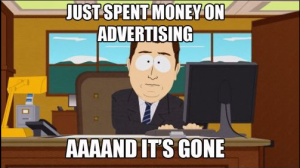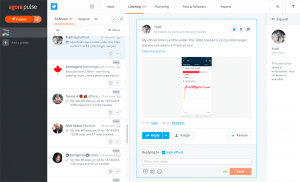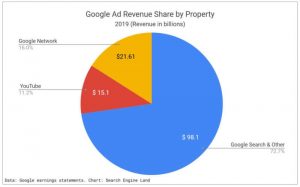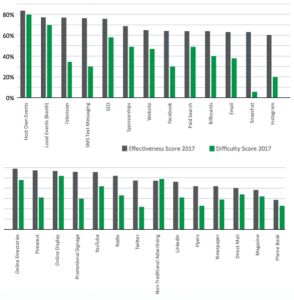The more live streaming evolves and the more I watch, the more I want to bang some people’s heads against a brick wall and have a serious word with them.
What I see becoming major issues with live streaming is that the masses of the online uneducated think it really is as simple as hitting start broadcast and off you go. You can live stream whatever you want. Even the so called “gurus” and “experts” tell you it’s that simple even you can press the button and be making money from your live streams in a matter of minutes.
Let me break this to you gently.
If you believe these bullshit peddling “gurus” and “experts” then eventually you are probably going to end up in a whole load of trouble and possibly some of that trouble being of the legal variety.
But if you still want to believe them then you’ll also believe that I will be scoping live from the moon next week. Without any form of astronaut training!
Yep, full of shit!
I’m sorry to always be the bearer of bad news or sound like a killjoy, but someone needs to tell it to you like it is. Even with the limitless possibilities of live streaming there are still some rules you need to play by. Some legal, some just for your own safety or the safety of those around you and some rules are to stop you falling into the same traps as those bloggers that got themselves labelled as unethical and earned a whole industry a bad reputation that is still vastly argued about.
So let’s start with safety.
Now that Periscope has relaxed its location settings and other apps give a more broad location when you broadcast, it is unlikely that your viewers are going to be able to pinpoint your exact location. However, that’s not to say that some more eagle-eyed viewers won’t be looking for signs.
The clues are usually in the minor details, so be careful of showing things like the outside of your home or your street, your car number plate or landmarks that are really close to your home. Also be mindful that if you are broadcasting from inside your home potential burglars could be looking for weak points within your home that they can get in by. Obviously if you are broadcasting a lot of your life then they are also likely to know when you are not at home.
Then there’s the topic of driving. If you scope and drive (or any other live stream for that matter) you are a dick. If I have to explain to you why you are a dick, then you’re an even bigger dick (and not dicks of the nice variety that us girls secretly like). I could go further and say that I’ll let the parent of the 3-year-old you could potential knock down and kill explain to you why you are a dick. If you aren’t getting it by now then you really need to pay more attention.
Whilst we are talking safety, I’ve heard some reports recently of people having their phones stolen whilst they are scoping out and about. Whilst this is a terrible thing to happen and obviously very traumatising for the people involved, it does raise the question of how safe is it to walk around busy city streets with a phone worth £500+ waving about in your hand in the air? Actually, are you making yourself a target for thieves?
The answer is yes, you are. A smart thief knows that whilst you are busy talking to your phone screen that’s positioned at arms length away from you, then you aren’t paying attention to your surroundings or others close by. It’s actually relatively easy for a thief to run up, blindside you and snatch the phone out of your hand.
The answer though isn’t to stop streaming in great places. The answer is to be more vigilant and if possible have something on your phone that physically attaches to you, making it harder for someone to snatch the phone out of your hand.
There is also the issue of the emerging trend for dangerous selfies that I have no doubt will be making it’s way into live streaming soon enough when the attention seekers crave more attention. There’s a great article here in The Guardian about this latest trend.
Remember, your safety and welfare is far more important than your audience, hearts, likes and any other measurement tool you feel you are judged by.
Next, kids. Personally, I do not believe that kids should be using live streaming. I’m not overly fond of kids using social media, but I also know that with careful parental monitoring it can be a good experience for kids. But I stand firm in my belief that live streaming is not for kids.
Why? In the near 9 years I have been working online I sometimes think I’ve seen it all, and then I see something that totally floors me and I realise that the Internet can still be a scary place and a great place to hide for some very unsavoury folk. If you are a parent and know enough about the Internet then you are probably well aware of the vast number of stories that have come out about the Minecraft communities and how many have been infiltrated by paedophiles. This isn’t the time or place to go into this subject so just Google it. You may learn a thing of two. The point being, these unsavoury folks are everywhere.
I hope that you are educated enough to know that on live streaming you literally have no idea who is watching. Like literally no idea. Do you honestly and seriously want some not very nice person getting their jollies by watching your kids on your live stream? Honestly, think about that for a minute.
Another point to consider here is if you are out and about live streaming and there are kids that don’t belong to you present. You may just be in a public place, a park, a beach, wherever. You absolutely cannot and should not film a child without parental consent first.
If I caught you filming my child without my permission I’d call the police first and then ask questions later. And I understand what live streaming is. The other 90% of the population don’t. They may just kill you first and then ask questions.
I’ll cover filming people in more detail in a minute, but for now be warned. Filming kids that aren’t your own could land you in some serious legal hot water.
Which brings us nicely round to legal.
I’ve already covered the scoping and driving thing. In some countries, this is actually illegal and will land you a fine and penalty points on your license.
Music. Let me put this bluntly (because I think you know by now I wouldn’t put it any other way). You may think you’re cool and great and entertaining doing your dance scopes and your karaoke scopes and live streaming a concert or randomly becoming a DJ with your “show” on Periscope.
Guess what? You’re not cool. You’re actually breaching copyright and breaking the law and pretty soon you’ll probably get sued. And I would be pretty confident in Taylor Swift or some other big name artist suing someone on Periscope pretty damn soon.
Oh what? You didn’t know that you had to have a person’s permission to use their material on your internet content? But you claim to be a tribe leading “expert”? Clearly then you are clueless and blindly leading others into a whole heap of trouble. Jog on.
So let’s get this absolutely clear. Anything that is potentially covered by copyright, so that’s music, images, live events (concerts, sports events etc) should not be used on your live stream. Period! Unless you 100% own the rights or have the express (written) consent of the material owner (artist) or a public performance license and pay royalties, then you can not use it.
All you karaoke dance scoping rule breakers could face rather large fines from the artists you are stealing material from (and yes they do view it as stealing their material). Those of you live streaming a sporting event from your tv are also in breach of copyright. If you’re at a concert or live sporting event and whip out your phone to Periscope it; again, you’re in breach and leave yourself wide open to legal action. And the platform you are using should remove your content. They should also kick you off, although you may just escape with a warning if you are a first time offender.
Make no mistake that by using copyright material or live streaming the football you are actually impacting on someone else’s income. And wouldn’t you be pissed if someone did that to you? You are not bigger or smarter than the artist. And I’d be about 99.99% certain they have deeper pockets than you and won’t mind suing you for the shirt on your back if you are ripping off their material.
When in doubt just don’t do it. Is your audience worth that much that you would risk being taken to court and having to pay a rather large fine? Will your audience or tribe leader pay it for you? No, I doubt it very much.

You thought is was cool to Periscope the concert? The artist doesn’t!
Ethical live streaming?
One topic that currently falls somewhere between legal and ethical is sponsored content. This can be in the form of a product review, an endorsement or a live stream that you are paid to do from a specific location. Payment does not always mean the receiving of physical money. It can be deemed as receiving a free product, so this is when we need to act with a bit more caution.
Depending on where you are in the world some guidelines will fall under legal and some will fall under ethical. For the purpose of this article I am going to refer to UK laws and standards, however as more and more countries are adopting the same rules and standards I will use what I consider to be best practise for all and certainly the standard you should be using to remain on the right side of good ethics.
In 2015 the ASA and OFCOM brought in new regulations following a number of complaints about YouTubers not disclosing that they had been paid to endorse, promote and review products and usually say very nice things about them. This was not just a UK problem and was actually rife in the US which led to the FTC adopting the same rules after consulting with OFCOM. Both agencies have the power to act anywhere in the world so living in a different country does not protect you if your audience is in the UK or US. Australia also has it’s own watchdog covering this too that is operated via a Government agency but as yet has not gone as far as the UK and US to enforce compliance. But that doesn’t mean to say that authorities outside of Australia can’t come after you if you think you’re in a safe haven there.
In short, if you are reviewing any product you are best to follow these guidelines;
Be totally honest and upfront with your audience. If you have been paid to review a product or be in a certain place then you absolutely have to disclose this. However sometimes just saying it at the start of your broadcast may not be enough as people can join at any point with a live stream and may not then be aware of your disclosure. The best and easiest way to get around this is to firstly have your own full disclosure statement on your own website (and if you don’t have your own website, and we’ve discussed this before, you need to get one) and then secondly, tweet out your disclosure when you broadcast. You probably won’t get all your disclosure into your live stream title so you should send a tweet just before stating your disclosure and then tag your broadcast with #ad #sponsored. Tagging alone is not good enough so make sure you disclose properly and effectively.
Even if you haven’t been paid, you will still need to do this if you have been given the products for free you are reviewing or if you are taking a trip and you haven’t paid for it, then again, this would still be classed as a sponsored advert broadcast. Disclose it and tag it.
If you have paid for the products or trip yourself and it is nothing to do with the companies in question then it is not sponsored or an advert and is purely 100% of your own doing and your own opinion, then you should disclose this too. This is just good ethics and could stop you landing in trouble if your content was potentially viewed as being sponsored.
If you fail to disclose your position and your content is viewed as commercial usage (sponsored advert) then you could be liable to a fine and your content should be removed from the platform you have used. Repeat offenders should in theory have their accounts suspended.
Likewise, if you endorse a product, for gods sake be honest in what you say and have total faith in the product. If you are viewed as an influencer and endorse a product that then turns out to be the worst product in the whole wide world ever, you could potentially be liable for damages payable to anyone that believed your review and bought the product on the back of what you said. If you have any doubt at all about a product or service you are asked to work with, stay well clear. And make sure you have adequate liability insurance just in case the worst does happen.

The pizza may have been great but did you tell your audience you didn’t pay for it?
There is also the financial implications of doing such work. If you are working with brands in any commercial usage way then you are in fact earning an income and this should be declared to the relevant tax authorities (HMRC in the UK). Even if you are just receiving a lot of free products there are rules around what could be classed as benefit in kind and you should seek advice from an accountant on this matter as rules and regulations vary depending on your current tax status and location.
Remember, all these authorities have the power to seize your assets so it is best to always air on the side of caution.
It’s also a good idea to stay within the lines of good ethics. Bloggers and Vloggers have for years battled against what was ethical and many divides have been created. Now what was once just viewed as ethical has become legal. If you break the rules and get caught out then that brand will never work with you again and your reputation will be dirt amongst PR’s the world over. Once your reputation has been tarnished you’ve pretty much no hope of recovering and your blogging/vlogging/live streaming days are over. And don’t think that live streaming is any different to blogging and vlogging. It’s exactly the same as far as the rules are concerned. It’s all content production for the Internet.
There is also a footnote to this in that I have seen some live streamers doing sponsored content, not quite getting the disclosure 100% right but on the right-ish tracks, but then the brand they work with has used the footage in their adverts. For this not to be a breach of your copyright as the live streamer that created the content, then you need to agree a release contract with the brand, which gives them the right to use your footage for their adverts (commercial usage). In my opinion, you should be paid for this and this is actually separate to whether or not you are paid for the review in the first place. This is when it helps to either know more about commercial usage content or bring in someone to help. If you are registered with an agent or management company then this is what they would help you with and negotiate on your behalf. Someone like me for example (shameless plug). Protect your rights but also don’t be ripped off.
Competitions and giveaways are also becoming popular on live streaming and usually sponsored by a brand. All of the above applies if you do a live stream to giveaway a product that has been given to you by a brand. They are going to want some promotion from it after all. However you also then have to remember that there are rules and regulations about running any form of contest and when you also do this through social media, each platform also has further rules.
When it comes to giveaways Facebook are by far the strictest of all the social networks. Breaking the rules on there will get you kicked off and they are ruthless about it too. But you also need to exercise caution when posting any giveaway to any social media. Here’s a few basics to keep you on the right track but I’d also advise you to look up the rules of each network before you post anything.
- Be clear with your audience that your giveaway is in no way endorsed or affiliated to the social network you are posting to.
- Do not insist that a user has to follow or like you. You can ask them to do this and share a post or leave a comment but this cannot be the only means of entry. You have to give other options
- Be absolutely clear and specific about start and end times of the giveaway. And by specific I mean, date, time and time zone. Also be clear about when the winner will be announced.
- You probably should have full terms and conditions for entry available on your website if you are working with a bigger name brand. For example stating things like family members of you and the brands employees are not allowed to enter (you may need to extend this to close friends too). Means and methods of entry, location of participants, minimum age requirements etc. Just enough details so that you can’t land yourself in hot water with the regulating authorities.
- If the winner is to be picked by a random draw then it’s probably a good idea to also live stream the draw. Or at least video it and make it available for general public viewing.
- If the winner is chosen through a judging process, ie the best photo, screenshot, caption, whatever, then be as open and transparent as is humanly possible. Perhaps get someone else to help you and even a third opinion. Maybe narrow it down to 3 or 4 entries and then live stream the final decision process. The reason for this is that if you don’t pick a genuine good entry, say if you pick a pretty shitty entry other entrants are going to complain, especially if their entry was genuinely better. And if you are popular enough to of attracted professional compers to your giveaway then boy oh boy will they complain (I’ll cover this in a minute). So the general guidelines here are to pick the actual best entry, perhaps just check out the entrant first to make sure that they are genuine (If they entered a photo did they actually take it? If they told a story was it theirs to tell? Are they who they say they are?). Try and cover yourself as much as possible.
Because once you attract professional compers then you will attract the complaints.
Professional compers are people that enter absolutely everything and anything. They enter hundreds of giveaways every week in the slim chance of winning the odd toaster or gift card. However, they take it very seriously and cross one of these at your peril. They have zero interest in you, your broadcast or the brand you are working with. It’s all about the prize and the winning and what they don’t want for themselves they will either sell on or re-gift. They know the rules inside out and back to front and way better than you. If you fuck up in the slightest and it’s a good prize they will be on to you in the blink of an eye and will report you.
I once had to deal with an irate comper over a £50 gift card and boy was she pissed. She couldn’t see the winners entry (it was on Facebook and the winners privacy settings meant that the complainer couldn’t see anything she posted). The complainer spammed every single post on the brands page. She contacted every single other entrant she could find to stir them up. She tweeted endlessly. When I sent her a screenshot of the winning entry she then abused the winner. She then gave up. But the damage was done. That brand has never run a giveaway since yet they had done absolutely nothing wrong.
See what I mean about crossing one at your peril!
And last but not least is showing other people in your live streams.
This is a bit of a subjective topic so we’ll go with the ethical side of it and I’ll tell you what I think is best practise.
If you don’t have the persons permission to show them in your broadcast then don’t. How simple is that?

I doubt she’ll want to date you once she knows you’ve shown her ass on Periscope. No matter how ‘Periscope Famous’ you think you are
An absolutely terrible example I have seen is guys (girls may well do this but I haven’t seen any) out in public, perhaps doing the walking along talking to their screen thing and they see a hot girl, make a comment about her and then turn the camera to show her. She is oblivious to this. Let this be known guys and I hope I speak for the sisterhood. If you did this to me, I’d kick your ass into next week and call you out for being a dirt bag in the process. Get it!
This is the modern day equivalent of cat calling in the street. And you are a lame ass dick for doing it. Now go and troll some girls scopes asking for open bobs! Oh but you claim to be against that and are disgusted by the sexist abuse women get on Periscope. Yet you just zoomed in on a girls butt to show your viewers how hot she is without her consent. Do you see the irony there?
If you are out and about in public then I get that other people may inadvertently end up in your broadcast. So long as you aren’t focusing on them or zooming in on them then I guess this is ok and just the same as someone ending up in the background of your holiday snaps. But just be mindful of other people’s privacy. We all have a right to our privacy and some people may have good reason to guard this. Have respect and courtesy for others at all times.
With anything that relates to keeping your content production on live streaming safe, legal and ethical the best advise I can give you is to protect yourself first before you play to your audience. I see so many people chasing the magic numbers of hearts, likes, followers etc but breaking every rule in the book in the process. Make no mistake the powers that be will catch up with these people and the more they play to their audience to increase their popularity, the quicker this will happen. Live streaming may be new but content creation for the internet is not and live streaming just falls into this category.
I am not a lawyer and nothing can ever replace the advise of a fully qualified legal professional. I can only tell you what I feel is best practise having worked in this industry for some considerable time.
When in doubt – ask a professional! Just make sure that they are an actual professional first and not some self-proclaim internet guru expert!
Digital & Social Articles on Business 2 Community(85)








